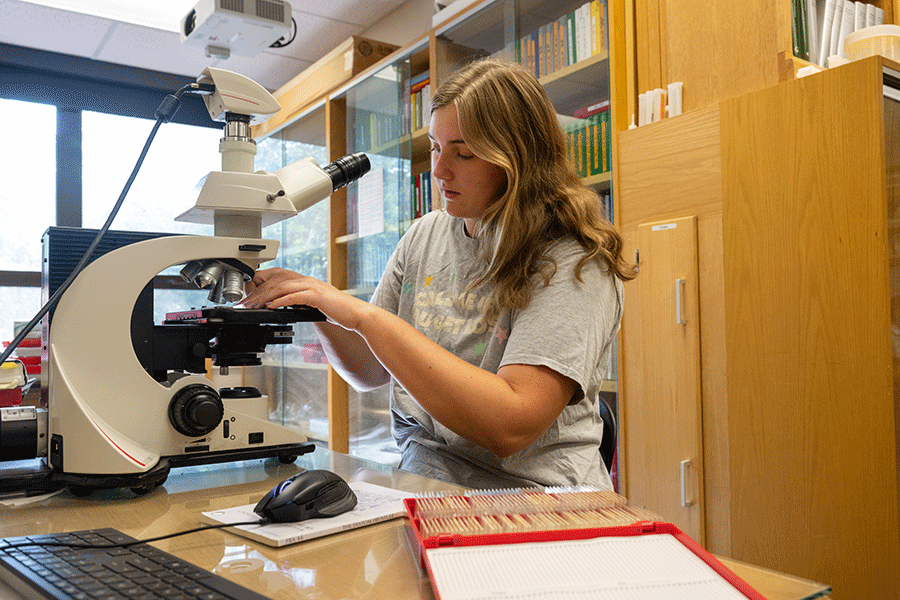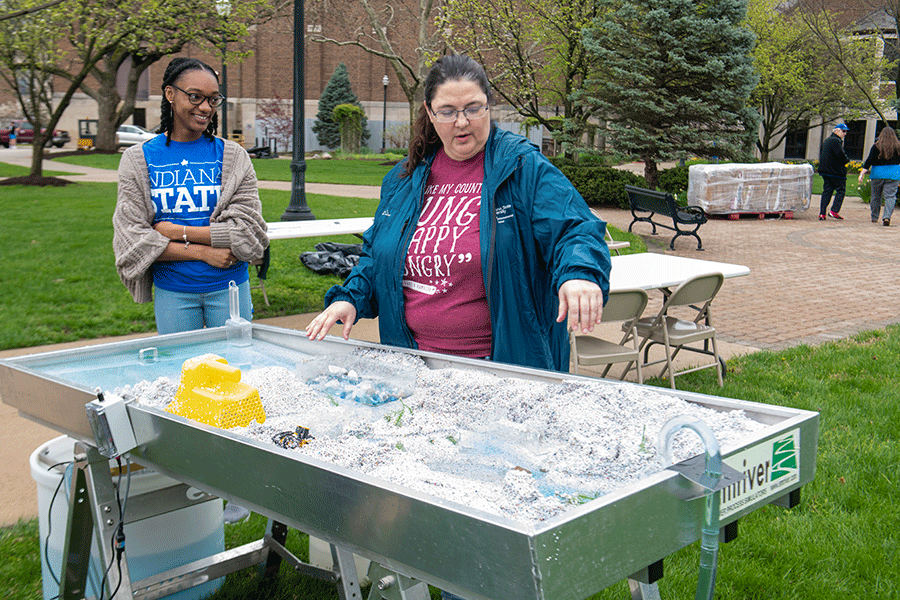Program Availability
The Master of Science (MS) in Geoscience at Indiana State University is a traditional, on-campus program offered on the Indiana State University campus in Terre Haute, Indiana. The program is open to U.S. and international applicants who satisfy admission requirements.
Why Earn a Master’s Degree in Geoscience at Indiana State?
Indiana State University’s Geoscience MS degree provides a strong interdisciplinary background in the study of Earth systems and processes. With a focus on modern-day geoscience research and the geologic past, the program prepares you for a range of career fields including geology, geography, and archaeology.
Gain Valuable Research Experience
The Geoscience MS program combines exciting experiential coursework with critical thinking and fieldwork experiences that prepare you to pursue research under the guidance of faculty mentors.
Our program emphasizes hands-on learning in the field and the lab, with a focus on earth and environmental systems, geography and sustainability, GIS and remote sensing, paleoecology, and quaternary environments. The program concludes with a research seminar; thesis and non-thesis options are available.
Alumni Mentor Program
Networking and connecting with alumni who have similar interests is a key tool for success. We strongly encourage Geoscience MS students to participate in our Alumni Mentor Program. It connects current students with successful program alumni who provide advice on job searches and other career mentorship.
Learn from Our Excellent Faculty
The Department of Earth and Environmental Systems has full-time, tenured/tenure-track graduate faculty with teaching and research experience covering a range of geoscience topics. Our faculty continually travel across the globe for fieldwork assignments and research.
Areas of specialization include but are not limited to: environmental geology, biogeochemistry, oceanography, environmental justice, remote sensing, GIS, dendrochronology, archaeology, quaternary paleoecology, paleoclimatology, and limnology.
You will work closely with your research advisor and committee to complete your Geoscience MS degree and research requirements.
Research Facilities and Funding
Research funding comes primarily from federal and Indiana state agencies and from private industry. Teaching assistantships are available.
Our well-equipped research facilities include laboratories for: remote sensing/GIS; climatology; urban environment and sustainability; environmental geology; biogeochemistry; biogeography; spatial analysis; paleoceanography; marine science; micropaleontology; sedimentary petrology; dendrochronology; and archaeology.
You will have the opportunity to work with scientists from other departments at Indiana State University. There are also opportunities for Geoscience MS students to work with colleagues from other universities and government agencies.
What You'll Learn in the Geoscience MS Program
The MS in geoscience focuses on experiential learning, critical thinking, and field experiences in an interdisciplinary study of Earth systems and processes. Specific research courses include geoscience research methods, quaternary environments, quaternary paleoecology, a seminar in earth and environmental systems, and additional research in spatial and earth sciences.
You will choose either the thesis or non-thesis degree option. The master’s thesis for the Geoscience MS degree is arranged by a thesis committee. This option requires 18 credits of directed electives related to your career interests. Similarly, the non-thesis option requires individual research in geography and sustainability, a research seminar in geology, and 21 credits of directed electives related to your career interests.
Assistantships and Scholarships
Many graduate students receive some form of financial assistance, including scholarships, fellowships, and federal financial aid. In addition, graduate assistantships (GAs) enable students to work on campus for up to 20 hours a week and include a stipend and partial tuition waiver. GA positions in the Department of Earth and Environmental Systems are highly competitive.
Career Possibilities for Geoscience Majors
Geoscientists are trained to work with minerals, soil, agriculture, energy resources, fossils, oceans and bodies of freshwater, the atmosphere, the environment, weather, and natural hazards. Indiana State University’s Geoscience MS degree provides a strong background in these areas to support careers in geology, geography, and archaeology. The degree is also excellent preparation for continued graduate studies at the doctoral level.
Many of our graduates have secured university-level academic positions, as well as high-salaried, decision-making positions with agencies including the British Geological Survey; CIA; Environmental Protection Agency; ERDAS, Inc.; ESRI, Inc.; Indiana Department of Environmental Management; Indiana Department of Natural Resources; Indiana Geological Survey; NASA; the U.S. Department of Agriculture; the U.S. Geological Survey; and many environmental and geological firms.
According to the Bureau of Labor Statistics, employment of geoscientists is projected to grow 5% from 2022 to 2032, faster than the average of all occupations. The median annual wage was $92,580 in May 2023.
Employment is on the rise in other geoscience-related fields:
- Anthropologists and archaeologists: 4% with the median annual wage at $63,800
- Atmospheric scientists: 4% with the median annual wage at $92,860
- Environmental scientists and specialists: 6% with the median annual wage at $78,980
- Hydrologists: 1% with the median annual wage at $88,770

A Whole Lot of Fish
When Spatial and Earth Science PhD student Kathryn Mudica, ’24, began working as a lab assistant in Indiana State University’s geochemistry lab, she devoted her research to soils and sediment samples. Encouraged by her faculty mentors, she began to study fish and otters and how contamination in fish could affect human health. Now, she plans to continue research in freshwater contamination, particularly in Indiana.
Read Kathryn Mudica’s story.Admissions Information and Application Instructions
To be assured of consideration for admission, all application materials must be submitted by January 15 (for fall entry) or November 1 (for spring entry). To ensure consideration for funding, applications must be submitted by the fall deadline, as funding is typically determined by the fall deadline each academic year. Conditional admission for missing documents is not granted.
Note: It must not be assumed that meeting minimal standards guarantees admission to the program.
Admission Requirements
Applicants must possess a bachelor’s degree in a relevant field from a regionally accredited institution (for international students, a degree granted by a recognized institution).
Applicants must have a minimum cumulative grade point average of 2.7 in all undergraduate coursework; or a minimum cumulative GPA of 3.0 in the last 60 credits of undergraduate coursework; or a minimum cumulative GPA of 3.0 in the applicant’s major field of study; or a minimum GPA of 3.0 in all courses taken at the graduate level.
The GRE (Graduate Record Examination) is not required for this program.
Application should include a current curriculum vitae and a personal statement/letter of intent that describes in detail your research interests and academic career goals and indicates the faculty member(s) you would like to work with. Please indicate if you would like to be considered for Graduate Assistantship funding and a tuition fee waiver in your statement.
Application should include three letters of recommendation from individuals familiar with your academic, research, and/or fieldwork record. Important: Have the names and email addresses of your references available at the time that you are completing your admission application, as you will need to enter them in the online application. Explain to your references that they will receive an email from Indiana State University requesting that they submit a letter of recommendation. Please ensure that your references expect to receive this request. It will be sent to your references immediately upon completing the application.
Applicants may also submit abstracts, conference posters, or writing samples.
International applicants must submit official scores for the Test of English as a Foreign Language (TOEFL) or provide equivalent evidence of language proficiency.
How to Apply
Complete your online application for program admission at apply.indstate.edu/portal/apply?tab=overview.
Please add the following text on a next line. The name of the college will need to be supplied for each program.
After selecting that you are applying for Graduate or International>Graduate admissions, you must select the college for your program. This program is in the College of Arts and Sciences.
Submit official transcripts from all colleges previously attended. To be official, transcripts must be sent directly from the college attended to: Indiana State University, Graduate Admissions, Welcome Center, 318 North Sixth Street, Terre Haute, IN, 47809. E-transcripts should be sent to admissions@indstate.edu.
Submit a nonrefundable application fee of $45.00 (U.S. citizens and permanent residents) or $55.00 (international students) payable by Visa, MasterCard, or check or money order payable to Indiana State University. Submit payment to: Indiana State University, Graduate Admissions, Welcome Center, 318 North Sixth Street, Terre Haute, IN, 47809.
Submit the following as part of the online application process.
- Names and email addresses of three individuals who will write letters of reference
- A personal statement/letter of intent
- A current curriculum vitae
- Optional supplemental documents: Abstracts, conference posters, or writing samples
International applicants must submit official scores for the Test of English as a Foreign Language (TOEFL) or provide equivalent evidence of language proficiency. Accepted language tests also include International English Language Testing System (IELTS) and Duolingo.
Submit scores to: Indiana State University, Graduate Admissions, Welcome Center, 318 North Sixth Street, Terre Haute, IN, 47809. For important information, see Instructions for International Students.
To be assured of consideration for admission, all application materials must be submitted by January 15 (for fall entry) or November 1 (for spring entry). To ensure consideration for funding, applications must be submitted by the fall deadline, as funding is typically determined by the fall deadline each academic year. Conditional admission for missing documents is not granted.
Next Steps
Once admitted, students receive notification from the University as well as their University ID number needed to activate their University Username on the MyISU Portal. The Portal offers access to online registration, University records, and other important University services, including email and University announcements.
Note: Returning Indiana State University students must apply for re-admission if they have not attended Indiana State for more than two calendar years.
-

Spatial and Earth Sciences (PhD)
Doctoral



